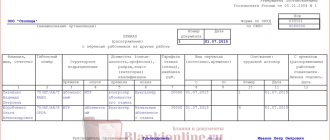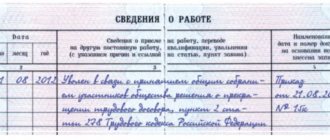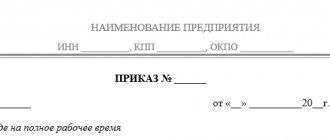Home / Labor Law / Payment and benefits / Wages
Back
Published: 03/04/2016
Reading time: 8 min
0
26162
Work on weekends is strictly controlled by law. The relevant provisions are enshrined in the Labor Code.
Unfortunately, employees do not always know their rights and responsibilities, and agree to perform work on weekends on the terms of their superiors. Meanwhile, without the consent of the employee himself, no order has the right to force him to work on holidays and weekends.
- When do you need to go to work on your day off?
- Pay for working on a day off
- Order to go to work on a weekend or holiday What to consider when filling it out
- What does he look like
What days are public holidays?
To get an answer to this question, you should refer to Article 112 of the Labor Code of the Russian Federation, which lists non-working holidays:
- January 1-6 and January 8 (New Year holidays);
- January 7 (Christmas Day);
- February 23 (Defender of the Fatherland Day);
- March 8 (International Women's Day);
- May 1 (Spring and Labor Day);
- May 9 (Victory Day);
- June 12 (Russia Day);
- November 4 (National Unity Day).
A detailed calendar with weekends and holidays can be found here.
Order "to yourself"
As I have already noted, quite often the question arises: can a manager, realizing the need to go to work on a day off, issue a corresponding order to himself? As an answer, I suggest that you familiarize yourself with the court decision set out below. And although the dispute in this case arose not because of work on a day off, but because of the failure to increase the manager’s salary after the start of production, the fact of challenging the feasibility and registration of his work on Saturdays or Sundays was also present there.
So, the specialist was hired as plant director. As we prepared for the first shipment of products, due to production needs, orders were issued to involve the plaintiff and other employees of the enterprise to work on weekends and non-working holidays. The manager worked them out safely, but he was not immediately given additional days off. After some time, a conflict broke out between him and the owner of the enterprise, and the manager (by that time “demoted” to the position of development director) decided to leave the company. Having made this decision, the ex-boss demanded a full payment from the employer. But instead, the founder turned to the State Labor Inspectorate so that officials could further check the fact that the manager worked on weekends. However, even after their positive conclusion, the money was not transferred. As a result, the former manager decided that all the unlawful actions of the employer caused him moral suffering. And the offended boss went to court with a demand to recover monetary compensation from the company for moral damages and lost wages, in particular for work on weekends and non-working holidays, as well as interest for violating the established payment deadline.
In the court of first instance, the plaintiff and his representative explained that in connection with the dismissal of the director by agreement of the parties without providing additional rest time for worked weekends and non-working holidays, he had the right to payment for the specified work, and the company, accordingly, had an obligation to pay for it. payment on the day of dismissal. And since the fact of work was confirmed by the labor inspectorate, weekends worked should be paid at double the rate.
However, the representative of the defendant indicated that the company is not obliged to pay the plaintiff money for weekends and non-working holidays worked by the latter due to the absence of an order from the general director to involve him in work during the disputed periods. The orders available in the case materials, issued by the plaintiff himself, cannot, in the opinion of the company representative, serve as the basis for paying money to the director, since he did not have the authority to issue such orders in relation to himself.
The trial judges supported the director's claims (decision of the Volosovsky District Court of the Leningrad Region dated November 22, 2014). Themis' servants indicated that the employer did not pay the plaintiff's salary in full, since from the moment production began, the monthly salary, according to the employment agreement, should have been increased. In addition, the court found that the plaintiff was involved in work on weekends and holidays: this is confirmed by orders with his own signature, witness statements and extracts from the sales book. No wages were paid during these periods either.
At the same time, the court of first instance proceeded from the fact that the absence of orders from the general director to attract the plaintiff to work on weekends and non-working holidays cannot “negate” the former manager’s right to appropriate remuneration (ruling of the Leningrad Regional Court dated January 21 2015 No. 33-307/2015).
Help your business grow
Invaluable experience in solving current problems, answers to complex questions, specially selected latest information in the press for accountants and managers. Choose from our catalog >>
Legislative norms
The main regulatory document is the Labor Code of the Russian Federation:
- Art. 113 regulates the procedure for working on holidays. It also lists situations where employees do not have the right to refuse to go to work even on such days.
- Art. 153 defines possible options for remuneration for work on holidays.
- In Art. 259, 264, 268 list categories of citizens who are prohibited from being employed on weekends;
- In Part 2 of Art. 372 states that the employer must take into account the opinion of the trade union.
The Code of Administrative Offenses of the Russian Federation establishes liability for violation of labor legislation (Article 5.27).
Unreasonable action or risk factor?
As practice shows, questions can be raised not only by the wording in individual documents accompanying the work of the manager during non-working hours and the legality of using a company car during the above-mentioned period. Sometimes the director has to prove the very expediency of his presence in the office on weekends. What arguments can be used for this can be seen from the dispute outlined below.
In accordance with the employment contract, the head of the company was given an irregular working day with days off on Saturday and Sunday. After the reorganization and the appointment of a new director, the owner of the enterprise conducted a commission audit of the activities of the former director. As a result of the audit, the business owner learned that the ex-director regularly worked on weekends for two and a half years and received an increased salary for this. The owner of the company regarded this as losses, and filed a claim in arbitration against the former boss to recover them.
The judges of the first instance and the appeal rejected the claim (decision of February 19, 2015 and the decision of the Fourteenth Arbitration Court of Appeal of April 28, 2015 in case No. A05-13833/2014). They explained that judging by the audit log and internal memos, on the ex-manager’s days off he performed only the work that, according to the employment contract and instructions, was part of his immediate responsibilities. And the fact of his presence was confirmed by a time sheet.
But the company representative was clearly convinced that the director’s work over the weekend brought only losses to the company, and filed a cassation appeal. In it, the plaintiff indicated that the presence of the director in the organization on weekends was impractical and unreasonable. In his opinion, since the director himself appointed specialists responsible for the storage and sale of special categories of goods, then he actually assigned the corresponding job responsibilities to them. Accordingly, he himself had no objective need to carry out similar checks on weekends. In addition, the memos regarding comments regarding the work of staff on weekends do not indicate the need to perform their official duties on Saturdays and Sundays. And from the check logs of posts it is not clear that it was the director who checked them.
note
Permission may be sought and obtained from community members prior to each director's working weekend. But at the same time, the fact that the involvement of a manager in work occurs on the basis of the decision of the founders must be stated in the charter.
But the cassation judges supported the opinion of their colleagues. They pointed out that the evidence presented by the plaintiff, which occurred during the director’s tenure in office, in the opinion of the judges, does not in itself indicate his bad faith and (or) unreasonableness of his actions. After all, the possibility of such consequences, the arbitrators emphasized, accompanies the risky nature of business activity. Moreover, all his actions and decisions were within the scope of the director’s responsibilities, including taking into account the scale of the legal entity’s activities and the nature of the corresponding action (GD of the Supreme Arbitration Court of the Russian Federation dated July 30, 2013 No. 62).
And regarding the controversial remuneration of the director, the judges indicated the following. According to the order of the general director “On work on weekends and holidays,” payments of remuneration for work during these periods were to be made to all employees in the company on the basis of a time sheet for the days actually worked and the standard hours of each month. And taking into account the rules of Article 153 of the Labor Code of the Russian Federation, payment should be double (resolution of the Arbitration Court of the North-Western District of August 26, 2015 in case No. A05-13833/2014).
The procedure for attracting employees to work on holidays
The employer determines the list of employees who need to be involved in going to work on a holiday. Employees give their written consent to leave. This can be a statement from the employee (in any form) or a note in the notice “I agree to be hired.” Consent is not required only in special cases listed in Art. 113 Labor Code of the Russian Federation.
If there is a trade union, the employer must take into account its opinion regarding the involvement of hired personnel to work on a holiday.
The manager must issue an order on working hours on holidays. The employees listed in the order become familiar with its contents. The fact of familiarization is confirmed by a signature on the order or familiarization sheet.
The employer keeps records of non-working holidays in the timesheet in the form T-12 and T-13. Work on holidays is paid at least double, or another day is provided for rest (Article 153 of the Labor Code of the Russian Federation).
Pay for working on a day off
Article 153 of the Labor Code provides two options for an employee who goes to work on a day off:
- he may demand double payment for the time worked (to determine the amount of wages, the hours actually worked are calculated, and not simply a double daily salary);
- he can take a day off on any other working day, but at the same time, pay for work on weekends is paid at a single rate.
In some enterprises, it is common practice for employees to be forced to choose one of the options. But the employee is free to choose for himself.
So, if he needs to earn more, he can take overtime and work on weekends for precisely this purpose. Consequently, he will not need time off, and it is unlawful to induce him to make such a choice.
How to notify employees of the need to work on holidays?
The staff must be informed in advance about the upcoming work. For this purpose, a special document is used - a notification. The Labor Code does not require that this document be handed over to employees. But many employers use such a notification, since it is convenient to notify staff about the upcoming return to work on a holiday.
Labor legislation does not establish a specific deadline for serving notice. If possible, this should be done as early as possible. But if a force majeure situation arises, you can give employees a notice on the eve of the holiday.
There is no unified form of the document. It usually indicates the reason why you need to go to work on a holiday and lists specific dates. Disabled employees and women mothers with children under 3 years of age must be notified of their right to refuse such work.
Employees can write their consent to return to work directly on the notice, this will avoid unnecessary paperwork. Here you can also make a note about how exactly they want to compensate for their work on a holiday (double pay / provision of time off).
Order to go to work on a weekend or holiday
What to consider when filling it out
To call an employee to work, one order is not enough. His written consent must be obtained. Usually it is enough for the employee to sign the order. However, the complete algorithm looks like this:
- The employer finds out about the need to involve the employee in work on a day off.
- He issues a written order to the employee’s immediate supervisor, but if the employee reports directly to him, then such a document is not needed.
- The immediate supervisor draws up a memo in which he justifies the need to leave, indicates the working conditions (time and place, specific actions that are required of the employee). If necessary, the note is agreed upon with a representative of the trade union committee.
- The employee will be required to provide written consent, which he can express in the form of a similar official receipt or by signing an order. He also informs about what kind of compensation he chooses: double pay or time off.
- Next, a draft order is drawn up, which is agreed upon with the employee himself, his immediate superior and the trade union representative.
- If everything is in order, a full order is issued, which the employee reads and signs.
The main compensation for dismissal of pensioners is severance pay. Are you interested in how to ensure that your length of service is taken into account when paying sick leave? You can find out here.
Are your salaries being delayed? This means they must pay compensation! You will find out how the amount is calculated in our article.
How to write a work order on a holiday
The order on work on holidays, a sample of which can be found below, does not have a form approved by law. It is compiled in any form. The basis for publication is a memo to the head of the organization (about the need to go to work) and a document in which the employee expressed his consent to work outside of normal hours.
The administrative document is signed by the manager; the employee himself and the responsible persons (QA inspector, chief accountant, etc.) must familiarize themselves with it directly.
The order has the following structure:
- "A cap". Here indicate the document number and the date of its publication.
- Next, they state the basis for working on a holiday and a link to the Labor Code article.
- Main part. The text of the order indicates the full name. and the positions of employees who will have to work on a public holiday, working hours, an agreed upon compensation option, an instruction to the chief accountant to pay double for the work (if this particular compensation method was chosen). The name and details of the document that became the basis for issuing the order are also indicated here.
The order on the work schedule on holidays contains an order from the head of the organization regarding which days will be considered working days. The Labor Code of the Russian Federation requires the issuance of such an order without fail (Article 113 of the Labor Code of the Russian Federation).
An employer does not have the right to force hired personnel to work on holidays. If an employee does not want to go to work on his day off, he only needs to verbally notify his superiors about this; he does not need to sign anywhere. In this case, the employer does not have the right to impose disciplinary sanctions or threaten dismissal.
When do you need to go to work on your day off?
However, Article 133 of the Labor Code describes cases when an employer has the right to urgently call his subordinate to work on a holiday or day off.
These are cases where urgent work is required that has arisen unforeseen, and if it is not completed on time, there is a risk of disruption to the normal functioning of the organization or there is a possibility of causing serious damage.
For example, if there is a flood at the enterprise (emergency situation), then the director has the right to call most of the staff to eliminate the accident.
However, in any case, this must be done with the written consent of the employee , and if he refuses, then no sanctions can be applied to him.
At the same time, there are categories of workers who cannot be involved in work on a day off under any circumstances. This:
- employees under 18 years of age (except for creative workers);
- athletes under 18 years of age;
- pregnant women.
Without written consent and a special order, the employer has the right to call employees in the following exceptional cases:
- to prevent a disaster or accident;
- to prevent an accident;
- to perform work due to the introduction of a state of emergency or martial law.
In addition, work on weekends must continue at the following enterprises:
- continuous production;
- related to public services;
- related to urgent repair and loading work.
In this case, a “sliding” schedule is organized for employees, and those who are hired to work on weekends are given time off on other days, or paid for work at a double rate.






